牛津深圳版九年级下册 Module 1 Unit 2 Culture shock 过关训练课件 (共54张PPT)
文档属性
| 名称 | 牛津深圳版九年级下册 Module 1 Unit 2 Culture shock 过关训练课件 (共54张PPT) |  | |
| 格式 | pptx | ||
| 文件大小 | 468.5KB | ||
| 资源类型 | 教案 | ||
| 版本资源 | 牛津深圳版 | ||
| 科目 | 英语 | ||
| 更新时间 | 2022-10-03 10:59:35 | ||
图片预览

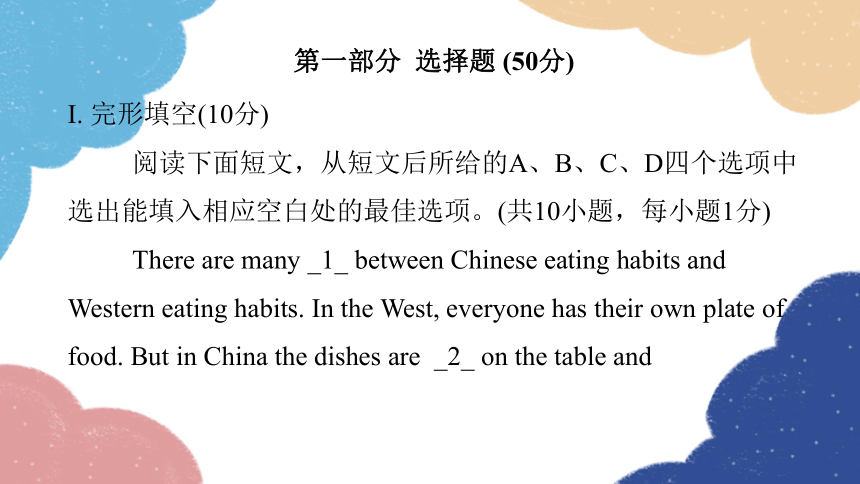
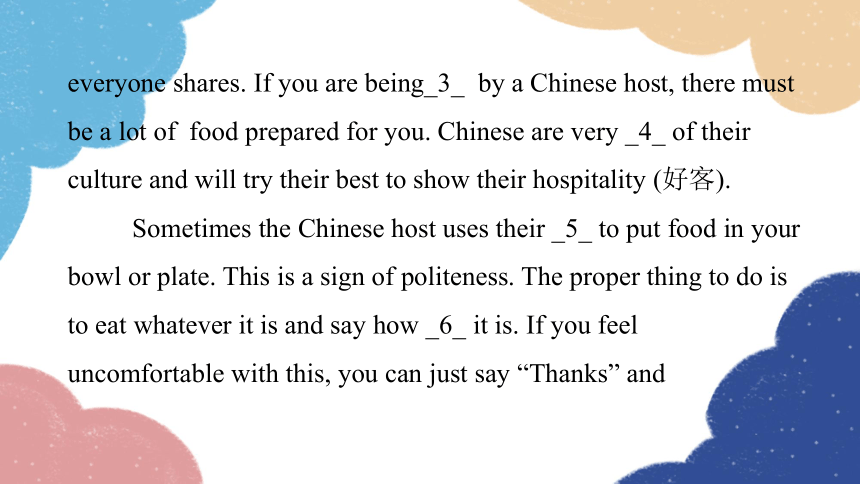
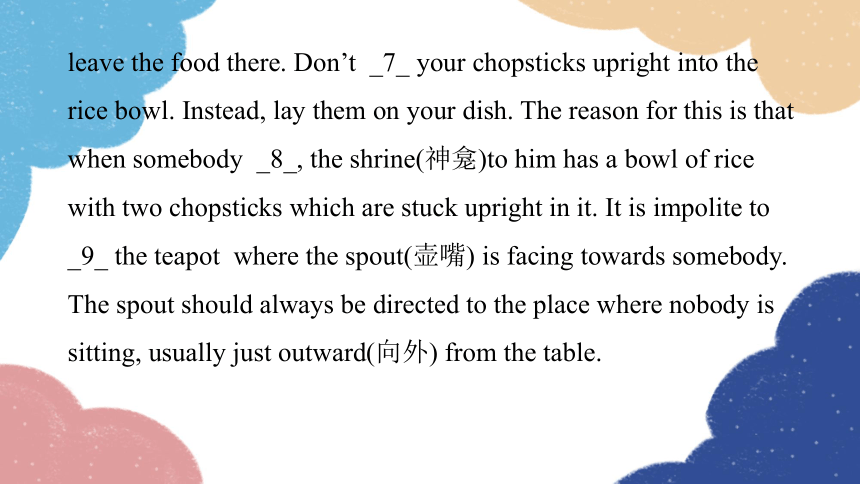
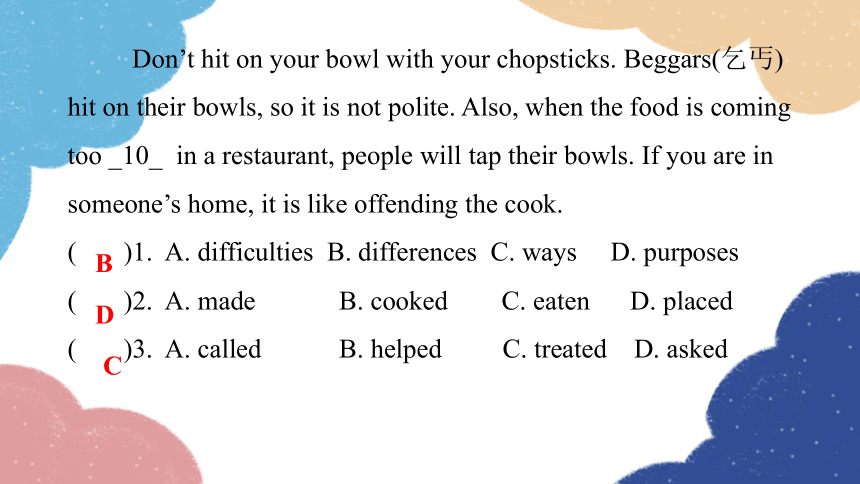
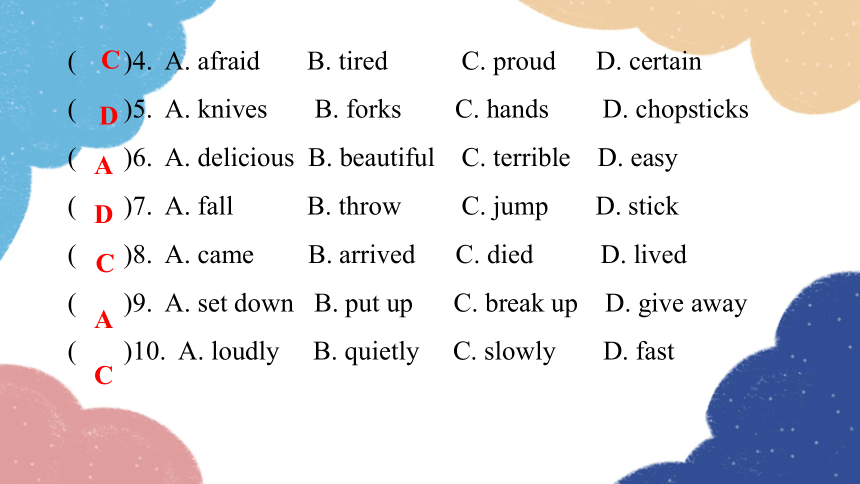
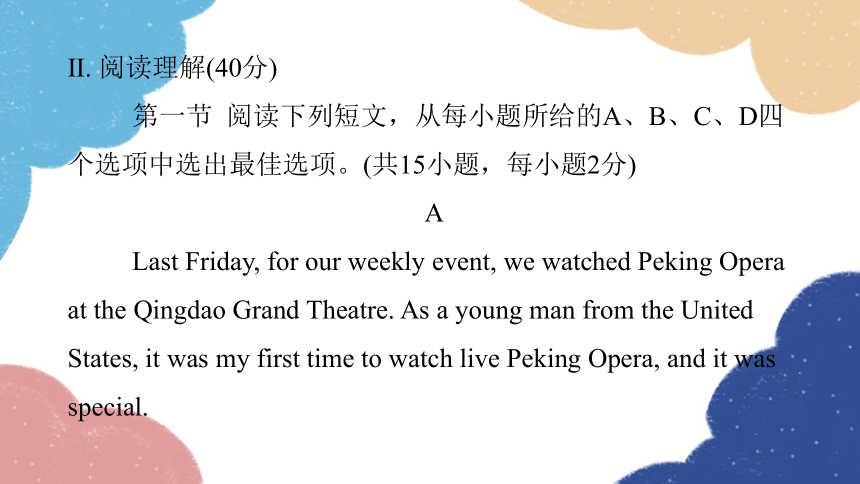
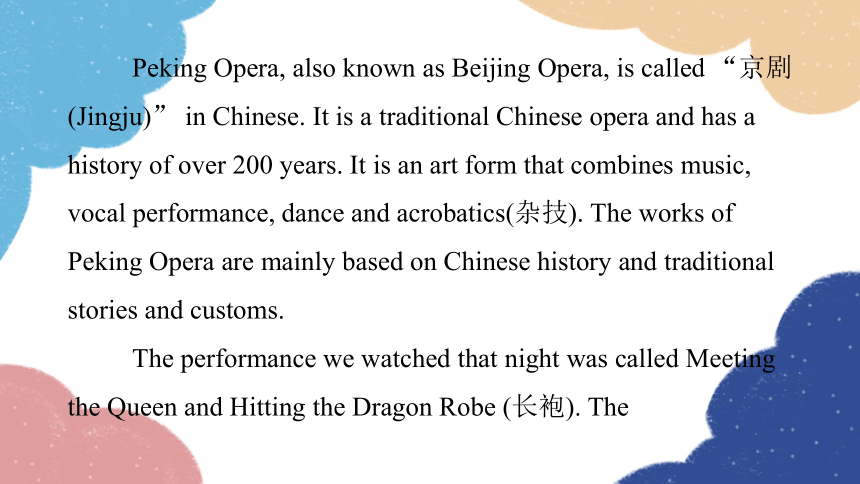
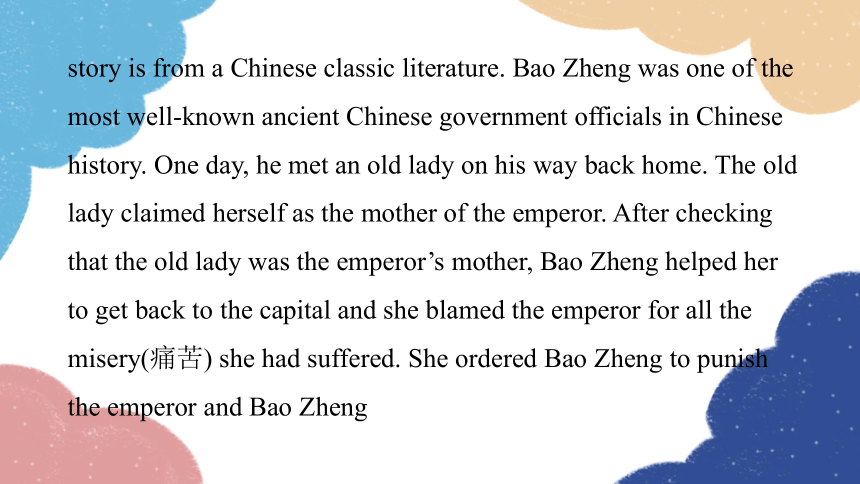
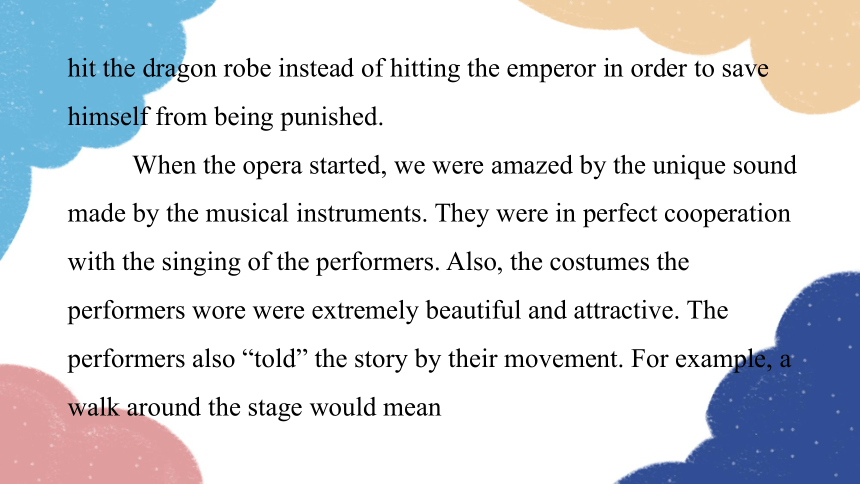
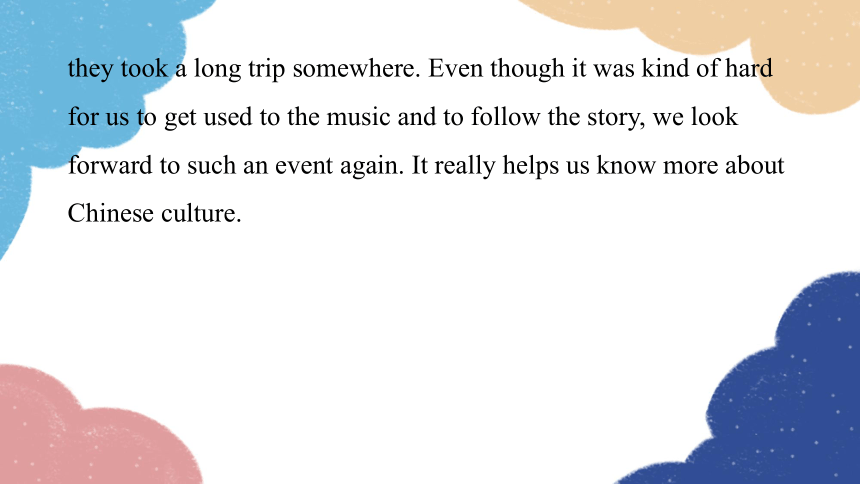
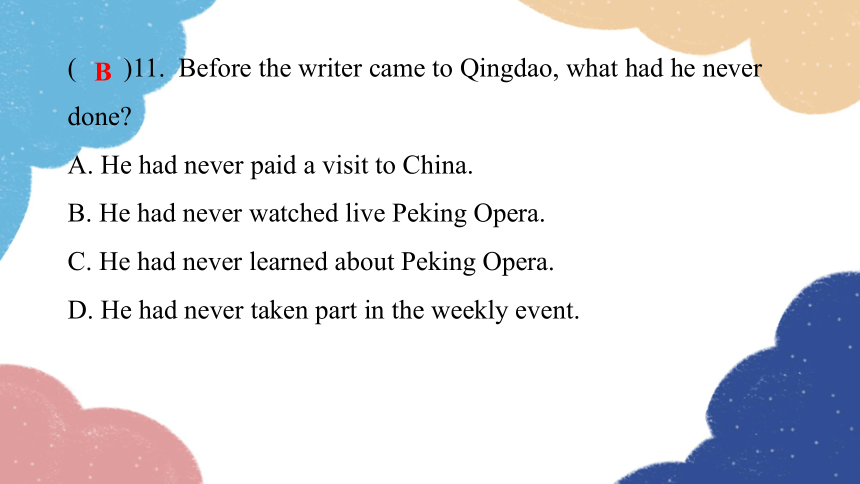
文档简介
(共54张PPT)
●下册●
Unit 2 过关训练
第一部分 选择题 (50分)
Ⅰ. 完形填空(10分)
阅读下面短文,从短文后所给的A、B、C、D四个选项中选出能填入相应空白处的最佳选项。(共10小题,每小题1分)
There are many _1_ between Chinese eating habits and Western eating habits. In the West, everyone has their own plate of food. But in China the dishes are _2_ on the table and
everyone shares. If you are being_3_ by a Chinese host, there must be a lot of food prepared for you. Chinese are very _4_ of their culture and will try their best to show their hospitality (好客).
Sometimes the Chinese host uses their _5_ to put food in your bowl or plate. This is a sign of politeness. The proper thing to do is to eat whatever it is and say how _6_ it is. If you feel uncomfortable with this, you can just say “Thanks” and
leave the food there. Don’t _7_ your chopsticks upright into the rice bowl. Instead, lay them on your dish. The reason for this is that when somebody _8_, the shrine(神龛)to him has a bowl of rice with two chopsticks which are stuck upright in it. It is impolite to _9_ the teapot where the spout(壶嘴) is facing towards somebody. The spout should always be directed to the place where nobody is sitting, usually just outward(向外) from the table.
Don’t hit on your bowl with your chopsticks. Beggars(乞丐) hit on their bowls, so it is not polite. Also, when the food is coming too _10_ in a restaurant, people will tap their bowls. If you are in someone’s home, it is like offending the cook.
( )1. A. difficulties B. differences C. ways D. purposes
( )2. A. made B. cooked C. eaten D. placed
( )3. A. called B. helped C. treated D. asked
B
D
C
( )4. A. afraid B. tired C. proud D. certain
( )5. A. knives B. forks C. hands D. chopsticks
( )6. A. delicious B. beautiful C. terrible D. easy
( )7. A. fall B. throw C. jump D. stick
( )8. A. came B. arrived C. died D. lived
( )9. A. set down B. put up C. break up D. give away
( )10. A. loudly B. quietly C. slowly D. fast
C
D
A
D
C
A
C
Ⅱ. 阅读理解(40分)
第一节 阅读下列短文,从每小题所给的A、B、C、D四个选项中选出最佳选项。(共15小题,每小题2分)
A
Last Friday, for our weekly event, we watched Peking Opera at the Qingdao Grand Theatre. As a young man from the United States, it was my first time to watch live Peking Opera, and it was special.
Peking Opera, also known as Beijing Opera, is called “京剧 (Jingju)” in Chinese. It is a traditional Chinese opera and has a history of over 200 years. It is an art form that combines music, vocal performance, dance and acrobatics(杂技). The works of Peking Opera are mainly based on Chinese history and traditional stories and customs.
The performance we watched that night was called Meeting the Queen and Hitting the Dragon Robe (长袍). The
story is from a Chinese classic literature. Bao Zheng was one of the most well-known ancient Chinese government officials in Chinese history. One day, he met an old lady on his way back home. The old lady claimed herself as the mother of the emperor. After checking that the old lady was the emperor’s mother, Bao Zheng helped her to get back to the capital and she blamed the emperor for all the misery(痛苦) she had suffered. She ordered Bao Zheng to punish the emperor and Bao Zheng
hit the dragon robe instead of hitting the emperor in order to save himself from being punished.
When the opera started, we were amazed by the unique sound made by the musical instruments. They were in perfect cooperation with the singing of the performers. Also, the costumes the performers wore were extremely beautiful and attractive. The performers also “told” the story by their movement. For example, a walk around the stage would mean
they took a long trip somewhere. Even though it was kind of hard for us to get used to the music and to follow the story, we look forward to such an event again. It really helps us know more about Chinese culture.
( )11. Before the writer came to Qingdao, what had he never done
A. He had never paid a visit to China.
B. He had never watched live Peking Opera.
C. He had never learned about Peking Opera.
D. He had never taken part in the weekly event.
B
( )12. What does Paragraph 2 mainly tell us
A. How to watch Peking Opera.
B. How to develop Peking Opera.
C. Some facts of Peking Opera.
D. The history of Peking Opera.
C
( )13. After Bao Zheng heard what the old lady told him, what did he do
A. He looked into it first.
B. He had no idea what to do.
C. He thought she was telling a lie.
D. He helped her get to the capital in no time.
A
( )14. Why did Bao Zheng just hit the dragon robe
A. Because he was told to do so by the queen.
B. Because he didn’t think the emperor was responsible.
C. Because he didn’t want to be punished by the emperor.
D. Because he wanted to show that the emperor was right.
C
( )15. How did the writer probably feel about watching Meeting the Queen and Hitting the Dragon Robe
A. Bored. B. Relaxed.
C. Curious D. Disappointed.
C
B
Culture shock refers to the confusing and nervous feelings a person may have after leaving a familiar culture to live in a new culture. In a new place, you’re sure to face a lot of changes. That can be exciting, but it can also be overwhelming (令人不知所措的).
To understand culture shock, it is helpful to understand what culture is.
Your environment has a big effect on your appearance and behaviour, and culture is a big part of the environment. Culture consists of the common things that you learn from your family, friends, school, and even strangers. These things influence (影响) how you look, act, and communicate.
People from different cultures have grown up with different values and beliefs. What they talk about and how they express themselves may be very different from what you are used to. What might be common in your culture might be unusual in the new culture. As a result, it’s natural to have difficulty getting used to a new culture.
One person’s adjustment (适应) to a new culture is not like another’s. In some situations, people are excited about their move. But some people may feel sad when they move to a new place.
Though people experience culture shock differently, these feelings are common: anxiety, frustration, loneliness and extreme (极度的) homesickness.
These feelings may get you separated from your new surroundings. But the good news is that culture shock doesn’t last long. If you stay calm and learn, your difficulties will pass.
( )16. What is culture in the passage
A. A familiar place where you live in.
B. An action you always do in public.
C. A kind of behaviour you learn from others.
D. A big part of the environment.
D
( )17. What does“consists of ”mean in Chinese in Paragraph 3
A. 远离 B. 组成 C. 联系 D. 追上
B
( )18. What is the main idea of Paragraph 4
A. Why it is difficult to get used to a new culture.
B. Different people have different values and beliefs.
C. The environment where you grow up influences you greatly.
D. Not all people have difficulty in the adjustment to a new culture.
A
( )19. Which of the following is NOT the common feeling when you experience culture shock
A. Loneliness. B. Frustration.
C. Happiness. D. Anxiety.
C
( )20. What do you think the passage will talk about in the next paragraph
A. How to prepare for your moving.
B. How to do with a new job.
C. How to deal with culture shock.
D. How to keep calm and stay healthy.
C
C
Last spring, I was lucky to be chosen to join in an exchange study programme. In my application letter, I was careful to express how much I wanted to see France. My excitement really came through my words. When I knew I would go to France to study for a term, all that I could think about was the fun of foreign travel and making all sorts of new and interesting friends.
The moment I arrived in Paris, I was greeted by a nice French couple who would become my host parents. My whole experience was cheerful and exciting until I received some shocking news from my programme coordinator (协调人). One of my host parents’ relatives died. They had to go away for several weeks. That afternoon, I had to move out of one family’s house into another. The exchange coordinator told me
I would have a roommate this time and asked whether I could share a bedroom with an English speaker. To avoid speaking my native language, I asked not to be placed with an English-speaking roommate. When I got to my new room, I introduced myself to my new roommate Paolo, a Brazilian, the same age as I, whom I was surprised to find playing one of my favourite CDs! In just a few hours, we knew we would be good friends for the rest of the term.
I left France with many stories, so when people asked me what my favourite part of the trip was, they were always surprised to hear me talk about my Brazilian friend Paolo. I love how people can seem so different, but end up being so similar. The most valuable lesson I got from studying in France isn’t just to respect the friendly people but to respect all people, for your next best friend could be among them.
( )21. How did the writer feel when he knew he was going to France
A. Bored. B. Nervous.
C. Excited. D. Angry.
C
( )22. Why did the writer have to move out of his first host family
A. Because he didn’t get on well with the host parents.
B. Because one of his host’s parents died after he arrived in Paris.
C. Because his host parents would be away for some time.
D. Because he expected to make some new friends.
C
( )23. Which of the following is NOT true according to the passage
A. The writer didn’t want to live with a person who could speak his native language.
B. The writer made friends with Paolo because Paolo gave him many CDs.
C. The writer left France with many stories.
D. The writer had a great time with his Brazilian friend.
B
( )24. What do we learn about the author
A. He was good at French before arriving in Paris.
B. He studied in France for a term.
C. He got to his host family by taxi.
D. He worked very hard in France on weekends.
B
( )25. Why did the writer write the passage
A. To tell us how to get used to the life in a foreign country.
B. To tell us how to make friends in a foreign country.
C. To recommend an exchange study programme to us.
D. To tell us his experience in an exchange programme in France.
D
第二节 短文填空
以下是一则短文,请阅读短文,并从下列方框里的六个句子中选择五个还原到原文中,使原文的意思完整、连贯。(共5小题,每小题1分)
A. Later, he gave a copy to his friend George.
B. In fact, it was not the writer’s real name.
C. The book was successful immediately.
D. It is also popular among many adults.
E. They enjoyed the story very much.
F. He wrote many stories for children.
Alice’s Adventures in Wonderland is one of the most loved children’s books of all the time. 26. ________ It tells the story of a girl named Alice, who follows a rabbit entering a magical world called Wonderland. The popularity of the book comes from its imagination, interesting story, and art work.
The writer of the book is Lewis Carroll. 27. ________ His real name was Charles Dodgson. One day, he took a boat
D
B
ride down the Thames River to have a picnic with three little girls who were friends of the family. To keep them entertained on the ride, he told them a story. Alice, the middle child, was the main character of the story.
28. ________ Charles later wrote the story down under the name Alice’s Adventures Under Ground and gave it to Alice as a Christmas present.
E
29. ________ George read it to his children and they loved it. George suggested to Charles that he make a book from his story. Charles then wrote more parts to the story until it was around 35,000 words. It was first printed in 1866, with art work by John Tenniel, under the name Alice’s Adventures Under Ground. 30. ________
A
C
第三节 信息匹配
阅读下面的建议,为五个人选出合适他们的建议,并将其标号填入题前括号内。(共5小题,每小题1分)
A. Teenagers should earn to make early decisions about careers and life. First of all, ask yourself what you really like and want to be. Then choose the subjects that help you achieve your dream.
B. I agree with you. Life should be colourful. You should learn to manage your time and balance your study and hobbies. Try to spare some time to do the things you are interested in.
C. As a ninth-grader, you should keep cool and make good use of your time. The first thing is to list everything you are not sure about and ask your teacher for help.
D. It’s normal to have problems between friends. Why not invite her to see a movie if she likes that It’s a good chance to communicate with each other.
E. Being a good kid is so hard sometimes. You should let your mum and dad know how you feel, and tell them that you also want to do better and are always trying your best.
F. Tell your parents that try not to compare you with other children, and tell them your feelings. You can ask them for suggestions to be better.
( )31. Cathy is going to take the big exam. She is so stressed because it can influence her future. The biggest problem now is how she can prepare for the exam.
C
( )32. Jenny’s best friend got angry with her because she didn’t let her copy in the exam. They haven’t talked to each other for several days. She wonders what she can do.
( )33. Andy is unhappy because his parents always compare him with other children. He knows they hope he can be better, but they never care about his feelings.
D
F
( )34. Luke heard that he had to choose courses after entering senior high school. That makes him really worried. How can he make a good choice
( )35. Amma sometimes feels life is so boring without anything interesting. There’s endless homework to do. She doesn’t think study is the only thing that students should do.
A
B
第二部分 非选择题(25分)
Ⅲ. 语法填空(10分)
阅读下面短文,在空白处填入一个适当的单词或括号内单词的正确形式。(共10小题,每小题1分)
China has the post-80s, post-90s and post-95s. While in the United States, they 36.________ (call) the Generation (一代人) X (Gen-X), Gen-Y and Gen-Z. If you were born after 1995, you belong to Gen-Z.
are called
What does this generation like to do or wear What’s cool, or not cool From 37.________ fairly early age they know how to use a computer. You will find them on MySpace, YouTube and Facebook 38.________ the Internet. By their teenage years, cell phones and video games are very popular. They watch Hanna Montana on television. They wear clothes with brand names.
a
on
Most teens wear brand-name clothes 39.________ (be)in fashion and to fit in with their friends. 40.________, not all Gen-Z youth like the style. Some prefer blue jeans and T-shirts. They don’t feel 41.________ (stress) if they dress differently from their friends. They just want to be 42.________ (they). They make them special by not fitting in with the crowd.
to be
However
stressed
themselves
Though they don’t care about their clothes, the electronic age 43.________ (influence)Gen-Z for many years. Sales of games, cell phones and electronics have increased 44.________ (quick) in recent years.
Do you spend time on the Internet Do you carry a cell phone or play video games You and American 45.________ (teenage)are more alike than you have imagined.
has influenced
quickly
teenagers
Ⅳ. 书面表达(15分)
假设你是赵凯,你的美国笔友Paul将来中国度假,他发电子邮件向你请教中国的礼仪。请你根据下面的内容要点,给Paul回一封电子邮件。
要点:1. 餐桌礼仪;
2. 送礼的注意事项;
3. 另举两点注意事项。
要求:1. 80词左右,开头和结尾已给出,不计入总词数内;
2. 文中不得出现真实姓名和校名;
3. 可适当增加细节,以使条理清楚、行文连贯;
4. 标点正确,书面整洁。
Dear Paul,
I’m glad that you’ll spend your holiday in China. Here are some things you need to know when you stay in China. ______
_______________________________________________________________________________________________________________________________________________________________________________________________________________________________________________________________
First, you should shake hands when you meet someone for the first time. Second, when you eat dinner, it’s not polite to point at others with your chopsticks. Besides, if you are going to a party, you should arrive on time or a few minutes earlier. What’s more, you
_________________________________________________________________________________________________________________________________________________________
Yours,
Zhao Kai
shouldn’t give clocks to your friends as presents. When in Rome, do as the Romans do. I’m sure you’ll enjoy your stay in China.
THANKS!
●下册●
Unit 2 过关训练
第一部分 选择题 (50分)
Ⅰ. 完形填空(10分)
阅读下面短文,从短文后所给的A、B、C、D四个选项中选出能填入相应空白处的最佳选项。(共10小题,每小题1分)
There are many _1_ between Chinese eating habits and Western eating habits. In the West, everyone has their own plate of food. But in China the dishes are _2_ on the table and
everyone shares. If you are being_3_ by a Chinese host, there must be a lot of food prepared for you. Chinese are very _4_ of their culture and will try their best to show their hospitality (好客).
Sometimes the Chinese host uses their _5_ to put food in your bowl or plate. This is a sign of politeness. The proper thing to do is to eat whatever it is and say how _6_ it is. If you feel uncomfortable with this, you can just say “Thanks” and
leave the food there. Don’t _7_ your chopsticks upright into the rice bowl. Instead, lay them on your dish. The reason for this is that when somebody _8_, the shrine(神龛)to him has a bowl of rice with two chopsticks which are stuck upright in it. It is impolite to _9_ the teapot where the spout(壶嘴) is facing towards somebody. The spout should always be directed to the place where nobody is sitting, usually just outward(向外) from the table.
Don’t hit on your bowl with your chopsticks. Beggars(乞丐) hit on their bowls, so it is not polite. Also, when the food is coming too _10_ in a restaurant, people will tap their bowls. If you are in someone’s home, it is like offending the cook.
( )1. A. difficulties B. differences C. ways D. purposes
( )2. A. made B. cooked C. eaten D. placed
( )3. A. called B. helped C. treated D. asked
B
D
C
( )4. A. afraid B. tired C. proud D. certain
( )5. A. knives B. forks C. hands D. chopsticks
( )6. A. delicious B. beautiful C. terrible D. easy
( )7. A. fall B. throw C. jump D. stick
( )8. A. came B. arrived C. died D. lived
( )9. A. set down B. put up C. break up D. give away
( )10. A. loudly B. quietly C. slowly D. fast
C
D
A
D
C
A
C
Ⅱ. 阅读理解(40分)
第一节 阅读下列短文,从每小题所给的A、B、C、D四个选项中选出最佳选项。(共15小题,每小题2分)
A
Last Friday, for our weekly event, we watched Peking Opera at the Qingdao Grand Theatre. As a young man from the United States, it was my first time to watch live Peking Opera, and it was special.
Peking Opera, also known as Beijing Opera, is called “京剧 (Jingju)” in Chinese. It is a traditional Chinese opera and has a history of over 200 years. It is an art form that combines music, vocal performance, dance and acrobatics(杂技). The works of Peking Opera are mainly based on Chinese history and traditional stories and customs.
The performance we watched that night was called Meeting the Queen and Hitting the Dragon Robe (长袍). The
story is from a Chinese classic literature. Bao Zheng was one of the most well-known ancient Chinese government officials in Chinese history. One day, he met an old lady on his way back home. The old lady claimed herself as the mother of the emperor. After checking that the old lady was the emperor’s mother, Bao Zheng helped her to get back to the capital and she blamed the emperor for all the misery(痛苦) she had suffered. She ordered Bao Zheng to punish the emperor and Bao Zheng
hit the dragon robe instead of hitting the emperor in order to save himself from being punished.
When the opera started, we were amazed by the unique sound made by the musical instruments. They were in perfect cooperation with the singing of the performers. Also, the costumes the performers wore were extremely beautiful and attractive. The performers also “told” the story by their movement. For example, a walk around the stage would mean
they took a long trip somewhere. Even though it was kind of hard for us to get used to the music and to follow the story, we look forward to such an event again. It really helps us know more about Chinese culture.
( )11. Before the writer came to Qingdao, what had he never done
A. He had never paid a visit to China.
B. He had never watched live Peking Opera.
C. He had never learned about Peking Opera.
D. He had never taken part in the weekly event.
B
( )12. What does Paragraph 2 mainly tell us
A. How to watch Peking Opera.
B. How to develop Peking Opera.
C. Some facts of Peking Opera.
D. The history of Peking Opera.
C
( )13. After Bao Zheng heard what the old lady told him, what did he do
A. He looked into it first.
B. He had no idea what to do.
C. He thought she was telling a lie.
D. He helped her get to the capital in no time.
A
( )14. Why did Bao Zheng just hit the dragon robe
A. Because he was told to do so by the queen.
B. Because he didn’t think the emperor was responsible.
C. Because he didn’t want to be punished by the emperor.
D. Because he wanted to show that the emperor was right.
C
( )15. How did the writer probably feel about watching Meeting the Queen and Hitting the Dragon Robe
A. Bored. B. Relaxed.
C. Curious D. Disappointed.
C
B
Culture shock refers to the confusing and nervous feelings a person may have after leaving a familiar culture to live in a new culture. In a new place, you’re sure to face a lot of changes. That can be exciting, but it can also be overwhelming (令人不知所措的).
To understand culture shock, it is helpful to understand what culture is.
Your environment has a big effect on your appearance and behaviour, and culture is a big part of the environment. Culture consists of the common things that you learn from your family, friends, school, and even strangers. These things influence (影响) how you look, act, and communicate.
People from different cultures have grown up with different values and beliefs. What they talk about and how they express themselves may be very different from what you are used to. What might be common in your culture might be unusual in the new culture. As a result, it’s natural to have difficulty getting used to a new culture.
One person’s adjustment (适应) to a new culture is not like another’s. In some situations, people are excited about their move. But some people may feel sad when they move to a new place.
Though people experience culture shock differently, these feelings are common: anxiety, frustration, loneliness and extreme (极度的) homesickness.
These feelings may get you separated from your new surroundings. But the good news is that culture shock doesn’t last long. If you stay calm and learn, your difficulties will pass.
( )16. What is culture in the passage
A. A familiar place where you live in.
B. An action you always do in public.
C. A kind of behaviour you learn from others.
D. A big part of the environment.
D
( )17. What does“consists of ”mean in Chinese in Paragraph 3
A. 远离 B. 组成 C. 联系 D. 追上
B
( )18. What is the main idea of Paragraph 4
A. Why it is difficult to get used to a new culture.
B. Different people have different values and beliefs.
C. The environment where you grow up influences you greatly.
D. Not all people have difficulty in the adjustment to a new culture.
A
( )19. Which of the following is NOT the common feeling when you experience culture shock
A. Loneliness. B. Frustration.
C. Happiness. D. Anxiety.
C
( )20. What do you think the passage will talk about in the next paragraph
A. How to prepare for your moving.
B. How to do with a new job.
C. How to deal with culture shock.
D. How to keep calm and stay healthy.
C
C
Last spring, I was lucky to be chosen to join in an exchange study programme. In my application letter, I was careful to express how much I wanted to see France. My excitement really came through my words. When I knew I would go to France to study for a term, all that I could think about was the fun of foreign travel and making all sorts of new and interesting friends.
The moment I arrived in Paris, I was greeted by a nice French couple who would become my host parents. My whole experience was cheerful and exciting until I received some shocking news from my programme coordinator (协调人). One of my host parents’ relatives died. They had to go away for several weeks. That afternoon, I had to move out of one family’s house into another. The exchange coordinator told me
I would have a roommate this time and asked whether I could share a bedroom with an English speaker. To avoid speaking my native language, I asked not to be placed with an English-speaking roommate. When I got to my new room, I introduced myself to my new roommate Paolo, a Brazilian, the same age as I, whom I was surprised to find playing one of my favourite CDs! In just a few hours, we knew we would be good friends for the rest of the term.
I left France with many stories, so when people asked me what my favourite part of the trip was, they were always surprised to hear me talk about my Brazilian friend Paolo. I love how people can seem so different, but end up being so similar. The most valuable lesson I got from studying in France isn’t just to respect the friendly people but to respect all people, for your next best friend could be among them.
( )21. How did the writer feel when he knew he was going to France
A. Bored. B. Nervous.
C. Excited. D. Angry.
C
( )22. Why did the writer have to move out of his first host family
A. Because he didn’t get on well with the host parents.
B. Because one of his host’s parents died after he arrived in Paris.
C. Because his host parents would be away for some time.
D. Because he expected to make some new friends.
C
( )23. Which of the following is NOT true according to the passage
A. The writer didn’t want to live with a person who could speak his native language.
B. The writer made friends with Paolo because Paolo gave him many CDs.
C. The writer left France with many stories.
D. The writer had a great time with his Brazilian friend.
B
( )24. What do we learn about the author
A. He was good at French before arriving in Paris.
B. He studied in France for a term.
C. He got to his host family by taxi.
D. He worked very hard in France on weekends.
B
( )25. Why did the writer write the passage
A. To tell us how to get used to the life in a foreign country.
B. To tell us how to make friends in a foreign country.
C. To recommend an exchange study programme to us.
D. To tell us his experience in an exchange programme in France.
D
第二节 短文填空
以下是一则短文,请阅读短文,并从下列方框里的六个句子中选择五个还原到原文中,使原文的意思完整、连贯。(共5小题,每小题1分)
A. Later, he gave a copy to his friend George.
B. In fact, it was not the writer’s real name.
C. The book was successful immediately.
D. It is also popular among many adults.
E. They enjoyed the story very much.
F. He wrote many stories for children.
Alice’s Adventures in Wonderland is one of the most loved children’s books of all the time. 26. ________ It tells the story of a girl named Alice, who follows a rabbit entering a magical world called Wonderland. The popularity of the book comes from its imagination, interesting story, and art work.
The writer of the book is Lewis Carroll. 27. ________ His real name was Charles Dodgson. One day, he took a boat
D
B
ride down the Thames River to have a picnic with three little girls who were friends of the family. To keep them entertained on the ride, he told them a story. Alice, the middle child, was the main character of the story.
28. ________ Charles later wrote the story down under the name Alice’s Adventures Under Ground and gave it to Alice as a Christmas present.
E
29. ________ George read it to his children and they loved it. George suggested to Charles that he make a book from his story. Charles then wrote more parts to the story until it was around 35,000 words. It was first printed in 1866, with art work by John Tenniel, under the name Alice’s Adventures Under Ground. 30. ________
A
C
第三节 信息匹配
阅读下面的建议,为五个人选出合适他们的建议,并将其标号填入题前括号内。(共5小题,每小题1分)
A. Teenagers should earn to make early decisions about careers and life. First of all, ask yourself what you really like and want to be. Then choose the subjects that help you achieve your dream.
B. I agree with you. Life should be colourful. You should learn to manage your time and balance your study and hobbies. Try to spare some time to do the things you are interested in.
C. As a ninth-grader, you should keep cool and make good use of your time. The first thing is to list everything you are not sure about and ask your teacher for help.
D. It’s normal to have problems between friends. Why not invite her to see a movie if she likes that It’s a good chance to communicate with each other.
E. Being a good kid is so hard sometimes. You should let your mum and dad know how you feel, and tell them that you also want to do better and are always trying your best.
F. Tell your parents that try not to compare you with other children, and tell them your feelings. You can ask them for suggestions to be better.
( )31. Cathy is going to take the big exam. She is so stressed because it can influence her future. The biggest problem now is how she can prepare for the exam.
C
( )32. Jenny’s best friend got angry with her because she didn’t let her copy in the exam. They haven’t talked to each other for several days. She wonders what she can do.
( )33. Andy is unhappy because his parents always compare him with other children. He knows they hope he can be better, but they never care about his feelings.
D
F
( )34. Luke heard that he had to choose courses after entering senior high school. That makes him really worried. How can he make a good choice
( )35. Amma sometimes feels life is so boring without anything interesting. There’s endless homework to do. She doesn’t think study is the only thing that students should do.
A
B
第二部分 非选择题(25分)
Ⅲ. 语法填空(10分)
阅读下面短文,在空白处填入一个适当的单词或括号内单词的正确形式。(共10小题,每小题1分)
China has the post-80s, post-90s and post-95s. While in the United States, they 36.________ (call) the Generation (一代人) X (Gen-X), Gen-Y and Gen-Z. If you were born after 1995, you belong to Gen-Z.
are called
What does this generation like to do or wear What’s cool, or not cool From 37.________ fairly early age they know how to use a computer. You will find them on MySpace, YouTube and Facebook 38.________ the Internet. By their teenage years, cell phones and video games are very popular. They watch Hanna Montana on television. They wear clothes with brand names.
a
on
Most teens wear brand-name clothes 39.________ (be)in fashion and to fit in with their friends. 40.________, not all Gen-Z youth like the style. Some prefer blue jeans and T-shirts. They don’t feel 41.________ (stress) if they dress differently from their friends. They just want to be 42.________ (they). They make them special by not fitting in with the crowd.
to be
However
stressed
themselves
Though they don’t care about their clothes, the electronic age 43.________ (influence)Gen-Z for many years. Sales of games, cell phones and electronics have increased 44.________ (quick) in recent years.
Do you spend time on the Internet Do you carry a cell phone or play video games You and American 45.________ (teenage)are more alike than you have imagined.
has influenced
quickly
teenagers
Ⅳ. 书面表达(15分)
假设你是赵凯,你的美国笔友Paul将来中国度假,他发电子邮件向你请教中国的礼仪。请你根据下面的内容要点,给Paul回一封电子邮件。
要点:1. 餐桌礼仪;
2. 送礼的注意事项;
3. 另举两点注意事项。
要求:1. 80词左右,开头和结尾已给出,不计入总词数内;
2. 文中不得出现真实姓名和校名;
3. 可适当增加细节,以使条理清楚、行文连贯;
4. 标点正确,书面整洁。
Dear Paul,
I’m glad that you’ll spend your holiday in China. Here are some things you need to know when you stay in China. ______
_______________________________________________________________________________________________________________________________________________________________________________________________________________________________________________________________
First, you should shake hands when you meet someone for the first time. Second, when you eat dinner, it’s not polite to point at others with your chopsticks. Besides, if you are going to a party, you should arrive on time or a few minutes earlier. What’s more, you
_________________________________________________________________________________________________________________________________________________________
Yours,
Zhao Kai
shouldn’t give clocks to your friends as presents. When in Rome, do as the Romans do. I’m sure you’ll enjoy your stay in China.
THANKS!
